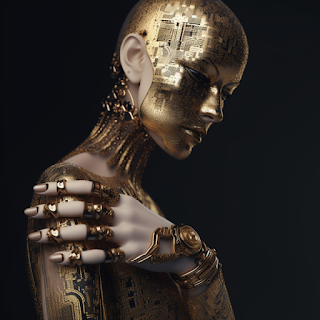AI is revolutionizing the jewelry industry in several ways, enhancing various aspects from design to customer service. Here are some key applications of AI in the jewelry sector:
### 1. **Design and Customization**
- **Generative Design**: AI can create unique jewelry designs using generative algorithms, providing designers with a plethora of design options.
- **Customization Tools**: AI-driven platforms allow customers to customize their jewelry pieces online, providing real-time visualization of their custom designs.
### 2. **Quality Control**
- **Defect Detection**: AI-powered image recognition systems can inspect jewelry for defects and ensure high-quality standards.
- **Gemstone Grading**: AI can grade gemstones more accurately and consistently than human graders, ensuring standardized quality.
### 3. **Inventory Management**
- **Demand Forecasting**: AI can analyze sales data and market trends to predict demand, helping jewelers maintain optimal inventory levels.
- **Supply Chain Optimization**: AI systems can streamline the supply chain, reducing costs and improving delivery times.
### 4. **Customer Service**
- **Virtual Assistants**: AI chatbots can assist customers with inquiries, helping them find the perfect piece of jewelry and providing information on care and maintenance.
- **Personalized Recommendations**: AI algorithms can analyze customer preferences and browsing history to suggest products that match their tastes.
### 5. **Marketing and Sales**
- **Targeted Advertising**: AI can analyze customer data to create personalized marketing campaigns, increasing the effectiveness of promotions.
- **Sales Analytics**: AI tools can provide insights into sales patterns, helping jewelers make data-driven decisions to boost sales.
### 6. **Augmented Reality (AR)**
- **Virtual Try-Ons**: AR combined with AI allows customers to virtually try on jewelry, enhancing the online shopping experience and reducing the need for physical try-ons.
### 7. **Fraud Detection**
- **Authenticity Verification**: AI can help verify the authenticity of gemstones and metals, protecting both consumers and jewelers from counterfeit products.
### Case Studies and Examples
1. **Tiffany & Co.**
- **AI-Driven Design**: Tiffany & Co. has explored using AI to generate new design ideas and streamline the design process.
2. **Blue Nile**
- **Virtual Try-On**: Blue Nile offers an AR feature that allows customers to see how rings look on their hands through their mobile app.
3. **Swarovski**
- **Personalized Recommendations**: Swarovski uses AI to analyze customer data and provide personalized product recommendations.
### AI in Jewelry Manufacturing
- **Precision Manufacturing**: AI-driven machinery can enhance precision in jewelry manufacturing, ensuring intricate designs are executed flawlessly.
- **Waste Reduction**: AI can optimize manufacturing processes to reduce material waste, making the production more sustainable.
### Conclusion
AI is significantly impacting the jewelry industry by enhancing design capabilities, improving quality control, optimizing inventory management, and personalizing customer experiences. These advancements not only improve operational efficiency but also create a more engaging and satisfying experience for customers.

Comments
Post a Comment